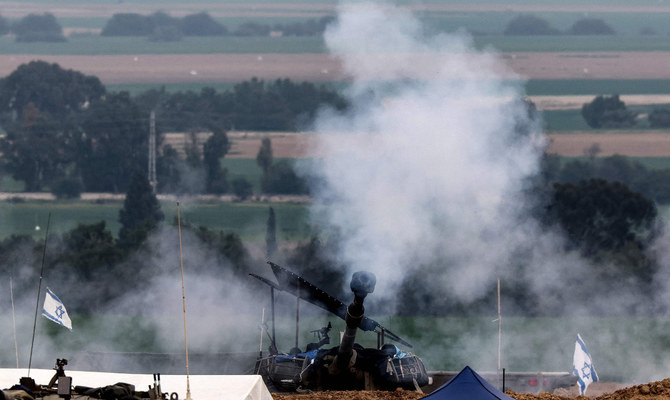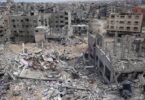Mohamed Chebaro
In its 100-plus days, the Israeli war on Gaza has clearly split the world. It has also escalated into pockets of proxy wars and wars of will between Israel and its Western allies on the one side and Iran’s so-called “axis of resistance” on the other. The latter has been lighting fires on the Israeli-Lebanese border, attacking US bases in Iraq and Syria and targeting military and civilian ships in the Red Sea.
The genocide case against Israel filed by South Africa at the International Court of Justice in The Hague could act as a circuit breaker and should present both sides with a ramp for de-escalation. Any ruling condemning Israel would probably remain symbolic, as the UN Security Council is unlikely to enforce it, given that the US and UK would be able to use their veto power. But such a ruling’s moral impact could bring all parties to push harder for a ceasefire, the delivery of aid and maybe talks that culminate in the release of the civilian Israeli hostages as a first step.
The foundations of today’s international humanitarian law rest on legal work undertaken around the time of the Second World War. The concepts of “crimes against humanity” and “genocide” were created by two Jewish law professors from Lviv in modern-day Ukraine, who witnessed persecution first-hand and endeavored to give a name and legal description to the crimes the Nazis committed against the Jews. Those terms were later adopted as the basis for the trials of Nazi leaders at Nuremberg.
It was Hersch Lauterpacht and Raphael Lemkin who developed and advocated for these legal concepts. Genocide was a term first introduced by Lemkin. It identifies those that single out groups of people and attempt to annihilate them, defining it as the most heinous crime. The concept of crimes against humanity is rooted in individual rights, the violation of which was believed by Lauterpacht to rise to the top of the scale of offenses.
It is clear from the cases presented by South Africa and Israel at the International Court of Justice last week that there is a huge gap in the narrative of the two sides. Yet many experts argue that the case for genocide presented by South Africa was strong enough for the court to issue a provisional ruling against Israel’s disregard for harm to civilians caused by its approach to fighting Hamas.
South Africa detailed the horrible conditions suffered by the Palestinians in Gaza, where more than 24,000 have died, which is about 1 percent of the Strip’s population. Some 70 percent of the victims have been women and children, while thousands more remain buried under the rubble. Its case also highlighted the displacement of 85 percent of the total population of Gaza, which stands at 2.4 million. About 65,000 residential units have been destroyed and more than 300,000 others damaged, which could leave half a million Palestinians with no homes to return to. Then there is the damage to hospitals and other vital civilian infrastructure. Israel, for its part, repeated the alleged genocidal plan of Hamas’ Oct. 7 attacks and its lawyers blamed Hamas’ practice of embedding itself within the civilian population for the massive damage. They said the group continues to display an indifference to civilian life and uses civilians as human shields.
Their arguments were, in the eyes of experts, weak, as the rule of law calls for refraining from firing if harm to civilians is likely. And atrocities committed by one party – even the aspiration to commit genocide – does not justify genocide in response, even in acts of self-defense.
Seventy-five years on from the signing of the UN Convention on the Prevention and Punishment of the Crime of Genocide, its effectiveness remains disputed. Since 1948, only three events have been legally recognized and led to trials under the convention: Rwanda in 1994, the Srebrenica massacre in Bosnia in 1995 and the crimes committed by Pol Pot’s regime in Cambodia between 1975 and 1979. Advocates and defenders of human rights have long believed that the list of events recognized under the UN convention should be much longer. As well as the two recent cases related to the killing and displacement of Yazidis by Daesh and the Rohingya in Myanmar, they point to the crimes committed in Darfur, Sudan, in 2004-05, Saddam Hussein’s actions against the Kurds between 1988 and 1991 and Stalin’s so-called great terror era.
Legal scholars have also argued that the Genocide Convention has failed due to the slowness of the process and the caution used in evoking the term when atrocities take place. There is also the constant failure of the international community to react effectively following acts of genocide, meaning that too few perpetrators have been indicted for such crimes. Currently – at a junction of history where a conflictive and divided world is testing all moral, ethical and judicial processes, as well as the validity of conventions and norms – evoking genocide and/or crimes against humanity might not be the easiest route to sanctioning those who are committing atrocities or saving the people of Gaza after more than 100 days of Israeli bombardment.
But if the South African case at the International Court of Justice opens the debate and helps focus the world’s thoughts and deeds on accountability, then it should be embraced, even for its mere symbolic value. Hopefully, it will focus minds on the need to find a formula to stop the killing and look for a solution to the Israeli-Palestinian conflict, which today risks engulfing the whole region.
Arab News







